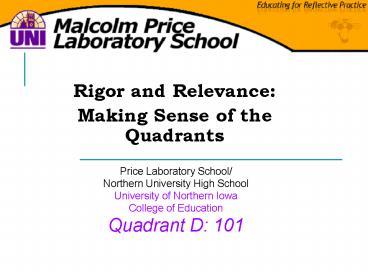Rigor and Relevance: - PowerPoint PPT Presentation
1 / 26
Title:
Rigor and Relevance:
Description:
Rigor/Relevance. Introductions. Megan Balong. Leasha Henriksen. Bridgette Wagoner. Why Rigor & Relevance? ... High Rigor High Relevance. C. D. A. B ... – PowerPoint PPT presentation
Number of Views:813
Avg rating:3.0/5.0
Title: Rigor and Relevance:
1
- Rigor and Relevance
- Making Sense of the Quadrants
Price Laboratory School/ Northern University High
School University of Northern Iowa College of
Education Quadrant D 101
2
- Three Part Mission
- Students
- Teachers
- Rigor/Relevance
3
IntroductionsMegan BalongLeasha
HenriksenBridgette Wagoner
4
Why Rigor Relevance?
- Many Iowa schools have adopted this model as a
tool to improve instruction because it . . . - Engages all teachers in school-wide efforts to
improve instruction, - Focuses on instruction,
- Provides a common vocabulary with which to
discuss teaching and learning.
5
Why Rigor Relevance?
- The Iowa Core Curriculum identifies rigorous and
relevant curriculum as one of the characteristics
of effective instruction. - Teaching for Understanding
- Balanced Assessment
- Student Centered
- Deep Conceptual and Procedural Knowledge
6
Rigor
- 6. Evaluation
- 5. Synthesis
- 4. Analysis
- 3. Application
- 2. Comprehension
- 1. Knowledge/ Awareness
7
Relevance
1 2 3
4 5
Gains knowledge in one discipline
Uses knowledge in one discipline
Connects knowledge across disciplines
Uses knowledge in real-world situations
Uses knowledge in real-world unpredictable
situations
8
- Daggett (2005)
Rigor/Relevance Framework
C Assimilation
Evaluation Synthesis Analysis Application
Comprehension Knowledge/ Awareness
D Adaptation
Rigor
Knowledge Taxonomy
A Acquisition
B Application
Knowledge in one discipline
Apply across disciplines
Apply to real-world predictable situations
Apply to real-world unpredictable situations
Apply in one discipline
Relevance
9
Quadrant A
- Represents simple recall basic understanding of
knowledge for its own sake. - Students gather and store bits of knowledge and
information. - Students are primarily expected to remember or
understand this acquired knowledge. - Example Conduct experiments to observe the
properties of acids and bases. - Low Rigor Low Relevance
10
Quadrant B
- Students use acquired knowledge to complete real
world work. - The highest level of relevance is to apply
appropriate knowledge to new and unpredictable
situations. - Example Test the pH of various household items
and make generalizations about which types of
products tend to be acids and
which tend to be basic. - Low Rigor High Relevance
11
Quadrant C
- Represents more complex thinking but still
knowledge for its own sake. - Students extend and refine their acquired
knowledge to be able to use that knowledge to
analyze and solve problems and create unique
solutions. - Example Conduct tests on a number
of samples of acids and bases to
determine the general properties
of acids and bases. - High Rigor Low Relevance
12
Quadrant D
- Students have the competence to think in complex
ways to apply knowledge and skills they have
acquired at high levels of thinking. - Even when confronted with unknowns, students are
able to use extensive knowledge skills to
create solutions take action that further
develops their skills knowledge. - Example Design your own experiment to determine
which antacid neutralizes the most stomach acid
present your results as a Consumer Reports
article. - High Rigor High Relevance
13
Students are working on teacher-directed,
real-life problems. Which quadrant?
- A
- B
- C
- D
14
Teacher is doing the working and the thinking.
Which quadrant?
- A
- B
- C
- D
15
Rigor Relevance Student Teacher Engagement
R I GOR
RELEVANCE
16
Select the Quadrant
- For each of the following slides, think about and
discuss the described activity with those close
to you and select the quadrant (using your remote
feedback device) you think represents the best
fit.
17
ScienceDiagram a carbon cycle and a nitrogen
cycle.
- A
- B
- C
- D
18
Physical Education
Create your own fitness game to be played in
class. In groups, come up with the rules,
equipment needed, assessment, and explain how it
meets the requirements of a fitness game. Teach
your game to the class and our UNI methods
students and answer their questions.
- A
- B
- C
- D
19
Math After seeing examples of prime
factorization, find the prime factorization for
120, 360 and 42.
- A
- B
- C
- D
20
Language Arts
After studying a chart that explains several
elements of poetry, use this understanding to
locate examples of the elements in popular song
lyrics.
- A
- B
- C
- D
21
Business
Research and analyze the effects and impact of
various big box retail stores on small businesses
and present your findings to the class.
- A
- B
- C
- D
22
Math
Research some text-messaging plans available in
your area and develop a mathematical model
representing each plan. Evaluate these plans,
and choose the one that is best for you. Explain
justify the criteria you used to make your
choice.
- A
- B
- C
- D
23
Following your exchange experience in Paris,
write an essay in French classifying the nature
of and attitudes surrounding leisure activities
in France and in the US. Explain the aspects that
correspond with each other and contrast the
aspects that differ. Judge whether your own
beliefs align more with one culture or another
and explain why.
French
- A
- B
- C
- D
24
Select two famous individuals from the Industrial
Revolution, research each person, then decide
which of the two made the greatest contribution
to society. Communicate this information through
a display board to be shared in a classroom
gallery walk.
Social Studies
- A
- B
- C
- D
25
Questions?
26
(No Transcript)































